
It’s March, which is the month, eight years ago, that we were told we would be getting fired from the church where my husband youth pastored. But, plot twist, it was a secret. We couldn’t tell anyone for two months, and they originally wanted us to work at the church through June.
Last year, I finally told our story with details. It was strange, freeing, and had some unexpected consequences—such as our old pastor calling and finally apologized to my husband.
I always think about our story in March even if it doesn’t affect me as much the rest of the year any more. Our bodies know. They keep track. On Friday I posted a Thread just remembering and pondering, and it blew up! I lost count of how many people shared their own broken story of power and abuse in church or other Christian ministries. It was heartbreaking and very familiar.
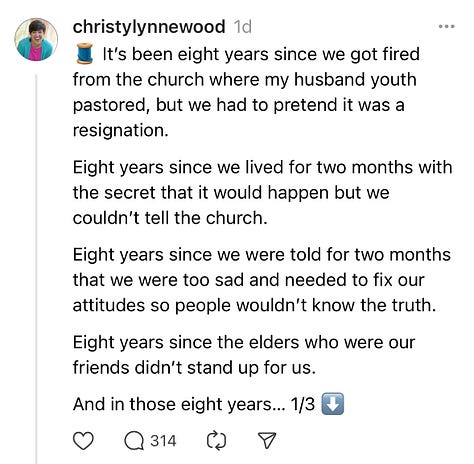
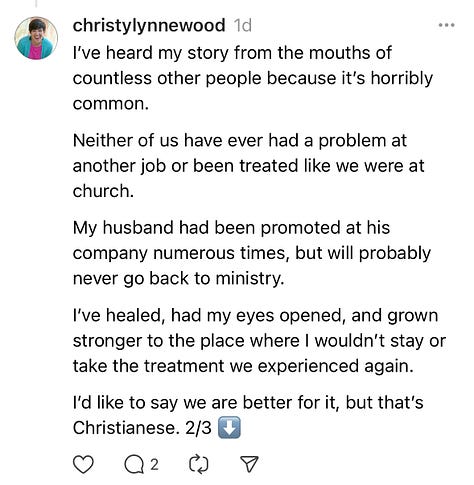
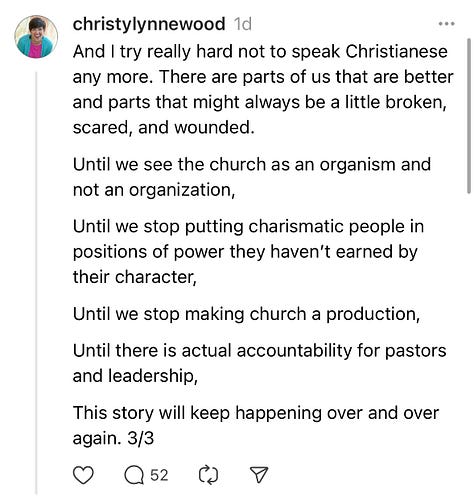
This problem of power and abuse within our churches isn’t new, and it doesn’t seem to be resolving any time soon. In my local area alone, I know of multiple churches who employ pastors who have abused their position of power and significantly damaged people. Most of them are still pastoring. Some retired with celebration. Only one church that I know of has had the guts to stand up and remove an abusive pastor, and it was a messy process that lacked transparency and caused conflict.
People have written books, done podcasts, and had discussions. So why is this problem of abusive pastors still so common? I’m not pretending to have all the answers; but as someone who has been through the devastating pain myself, I have some thoughts.
An Emphasis on Silence: Soon after we’d been let go, I wrote a cryptic blog post on spiritual abuse and how it reminded me of miscarriages. I talked about how I didn’t know miscarriage was so common until I had one myself and multiple women told me that they understood my pain. I didn’t post anything overt, but I still got called out. Someone with close ties to the senior pastor wanted to know if I was talking about our old church. I tried to brush it off as processing my past in a Christian cult, but I was talking about it.
I still think that spiritual abuse is like miscarriage. As my Threads post showed, there are far more people who have experienced spiritual abuse (and other types of abuse) in Christian organizations than anyone wants to realize. But we often stay quiet about it for a variety of reasons.
Excuses and Cover-Ups: One of the people commenting on my post wanted to know why we lied about what had really happened at the time. Why did we agree to pretend we were resigning and that God was moving us on from the church? Why did we stay during the year of abuse before we were fired? There were many layers to my answer.
We stayed because we made excuses for what was going on, because we didn’t want to hurt the church we loved, because we were praying and believing that God could do a miracle, and because we loved the kids we were teaching. We didn’t tell the truth because we were poor, had two small children, and as I said earlier, our severance was tied to our silence. We’d also been beaten down for a year and I’d been called a gossip for telling other truth, so we wondered if we’d be believed. I’d also been conditioned to obey authorities pretty much no matter what. I’d been told to believe God had a plan I couldn’t see and that suffering was a blessing.
Many of these reasons are why abusive situations continue to be covered up in churches. People want to believe the best, they want to protect the church and the people in it, and they’ve also been conditioned not to question people in places of power.
False Grace and Lack of Accountability: It’s strange but in spiritually abusive churches most of the grace people give seems to go to the perpetrating pastor. I hear this almost every time I read about a well-known Christian leader getting caught in sin. People want to extend grace and remind everyone that we are all sinners, but the same grace doesn’t apply to their victims. In fact, many churches don’t want to call the people who have been abused victims at all. They often use Christianese language and again make excuses for what happened instead of being clear and transparent. Church people extend grace to the abuser, condemn their victims, and put the abuser back into a place of power without accountability. What could go wrong?
The lack of accountability is usually what put the abusive pastor in a place of freedom to do what they wanted in the first place. Every book on spiritual abuse I’ve ever read always talks about the way abusers are able to surround themselves with “yes people.” If things are going to change in our churches, true accountability needs to happen.
The Wrong View of Church: The body of Jesus was never meant to be a corporation run by a CEO according to a business model. It’s supposed to be an organism not an organization. It’s meant to be a place to participate not a production to consume. If we look at history, every time the church took a stance of power and control, it lost the life of the Spirit. Bad things happened.
I currently lead the young adult group at our church. Last Wednesday ten young adults and I sat in a circle together. One of the guys shared his story. He talked about the importance of community in his life, the way Jesus has dragged him along at times, and how he is learning to let go of control and trust God. Afterwards people commented, I asked some questions, and we talked. They were honest about their own struggles, and they encouraged one another. We shared some prayer requests and answers to prayer, and then we closed by praying together—a time of quiet contemplation and then “popcorn style” as people wanted to pray out loud. There was laughter, snacks, and circles of conversation. I walked away that night thinking, “This is the church. This is what it is supposed to feel like.”
There’s no power structure at our young adult group. No one gets paid. No one even preaches. Sometimes an “old adult” facilitates a conversation, and other times someone shares their story. We don’t do formal worship, but we have awkwardly sung together while someone strummed a guitar after eating homemade waffles at my house. It’s organic and real, and I love it.

I’ve been chewed up and spit out by a church more than once in my forty plus years. I can count on one hand the places I’ve been that felt truly healthy to me (and maybe that’s just because I didn’t get in too deep). I’m incredibly tired of the cycle of abuse and cover-up. I hate that so many people haves been deeply wounded by places and people that claim the name of Jesus. I want to make a whip and flip tables when I think about the people who have walked away from faith because of the destruction they’ve faced.
But I still believe in the Body of Jesus. I still believe in the value of Jesus followers meeting together. I still attend a local church.
I think part of my resilience is due to my larger story of spiritual abuse. I met Jesus by accident while I was in a fundamental Christian cult (Shiny Happy People for those of you who don’t know my story). I’ve had to tear apart my faith more than once in a search for truth and the real Jesus. It hasn’t been easy, but it has been worth it. I know that he is real and worth following.
I’ve also recently met pastors and priests here on Substack and on Threads who inspire me with their empathy, humility, and concern for people. These lovely men and women have helped to heal pieces of my broken heart, and I am incredibly grateful for them and their love of Jesus and his people.

During our year of spiritual abuse but before we’d been secretly fired, my senior pastor spent eight weeks “counseling” me. I use that term very loosely. I look back on those weeks of gaslighting and think about what would have happened if the Christy I am now could suddenly have taken over my body. She would have stood up in the middle of the session and calmly said, “You’re lying, and I don’t have to listen to this any more. I am not a gossip; I’m just telling truth that you don’t want to hear. Thank you for your time, but I won’t be coming back.” Then she would have walked out of the door. She’d tell her husband that it was time to quit, and they would have left the church free to tell the truth about their story.
It’s time to tell the truth. We must tell truth about what is happening with abusive power structures and with abusive leaders. This abuse is not of Jesus. If He was passionate enough about the temple to make a whip and flip tables, I can imagine that he is even more passionate about his own body.
I’m closing this with a list of people I appreciate and articles I’ve written. Feel free to comment with anyone or anything you’d like to add.
These are articles I wrote on my blog while everything was pretty fresh.
As always, I'd love to hear your thoughts, questions, or comments. You can find me on Threads, Instagram, Facebook, in the Substack app, and on my website. I’d love to connect with you on any of these places!
My podcasts, Religious Rebels and Looking for the Real God can be found here on Substack, and on YouTube, Apple Podcasts, Spotify, iHeart Radio, and anywhere you listen to podcasts.
You can order an autographed copy of my book, Religious Rebels: Finding Jesus in the Awkward Middle Way by clicking on the button below. Or you can find it on Amazon.




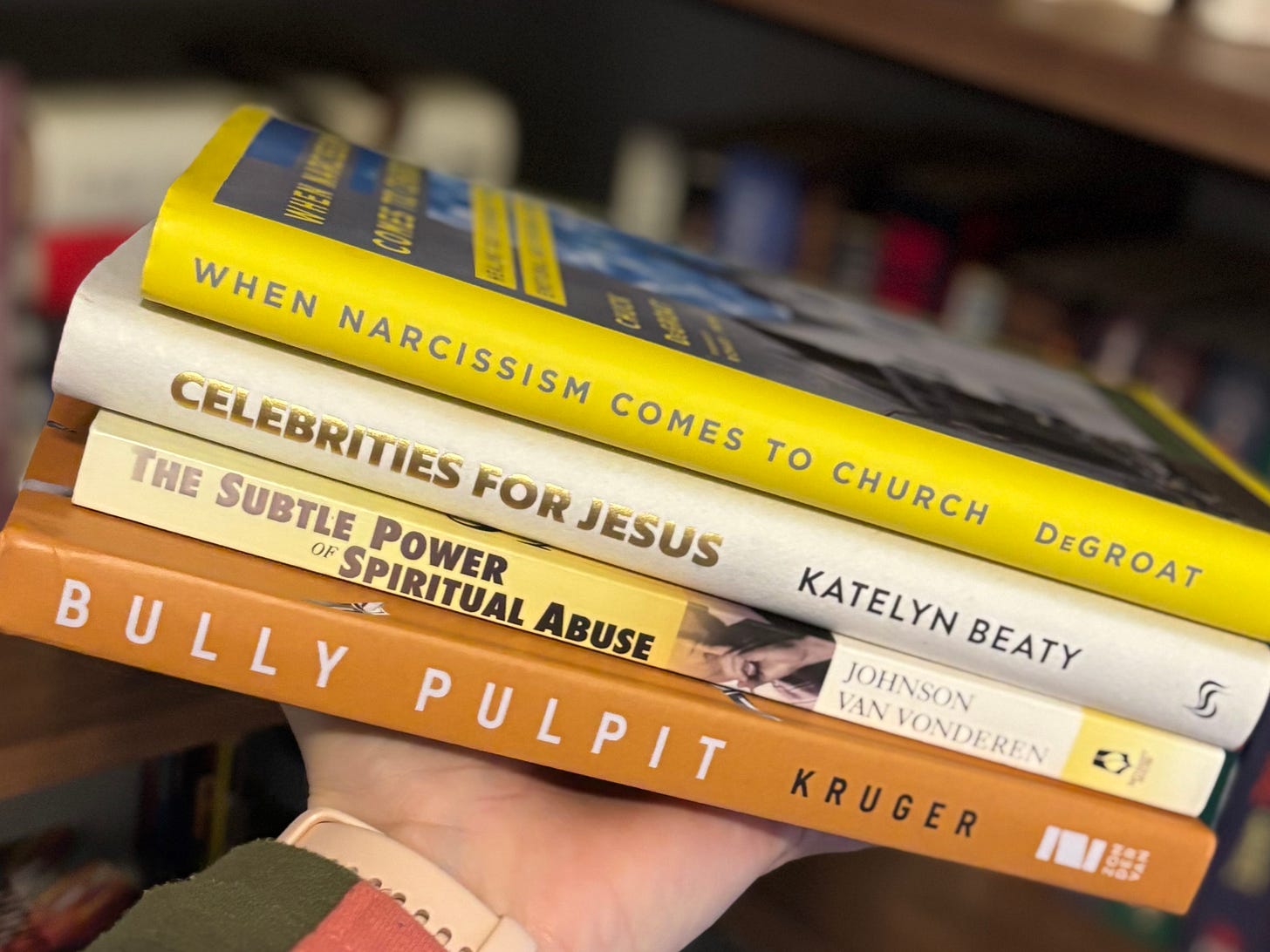

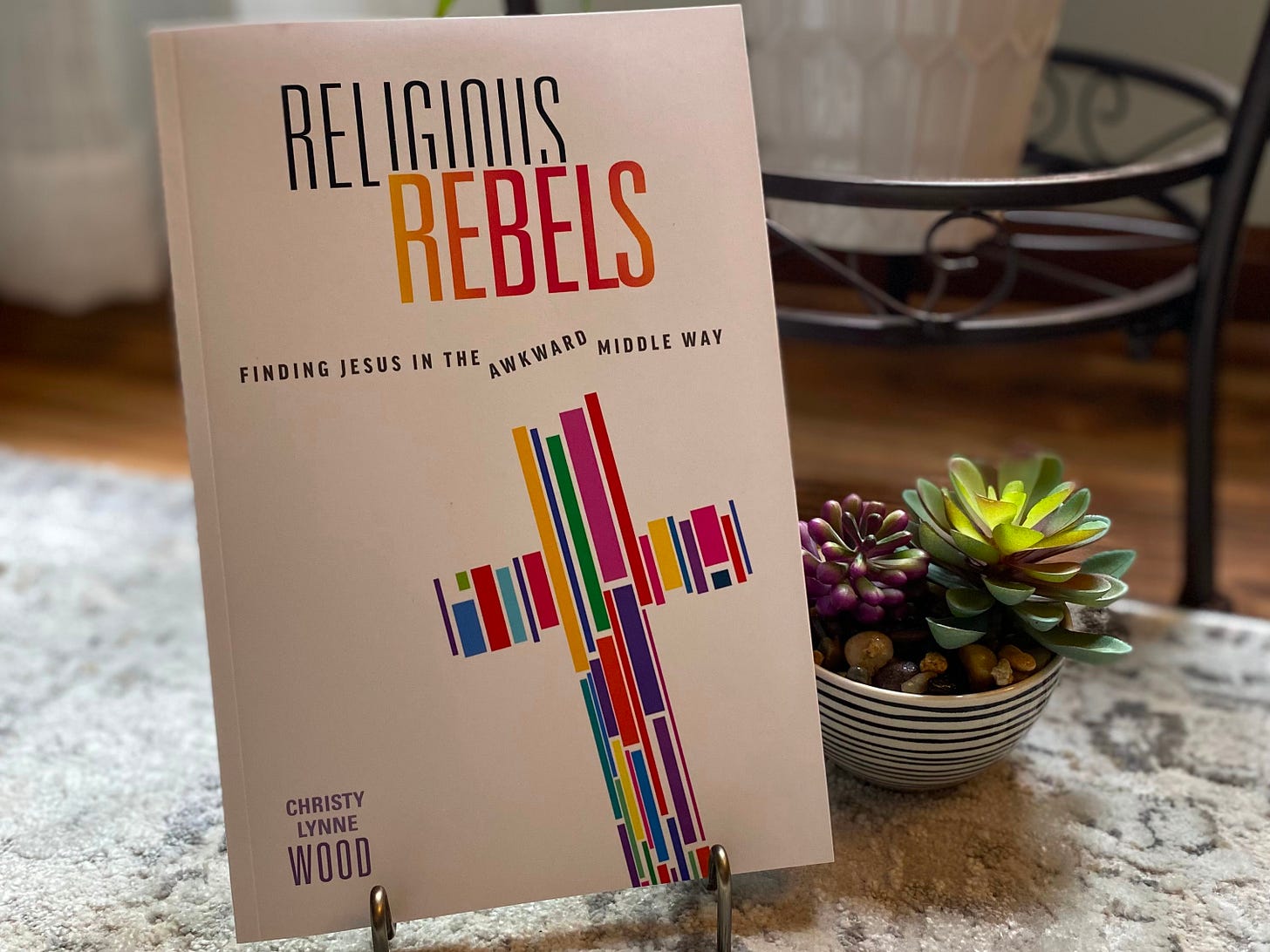
“The body of Jesus was never meant to be a corporation run by a CEO according to a business model. It’s supposed to be an organism not an organization.”
Louder for the folks in the back!
Western capitalism has infiltrated the culture of large churches so they’re indistinguishable from self-help consumer products, complete with a CEO, board of directors, middle management, employees, and paying customers.
Loved how you contrasted the new Christy with how you used to be. Was a powerful call not just to overcome but to advocate for truth and righteousness!